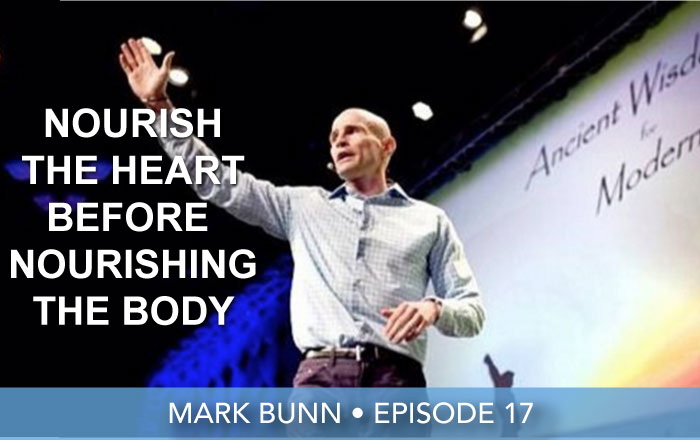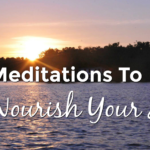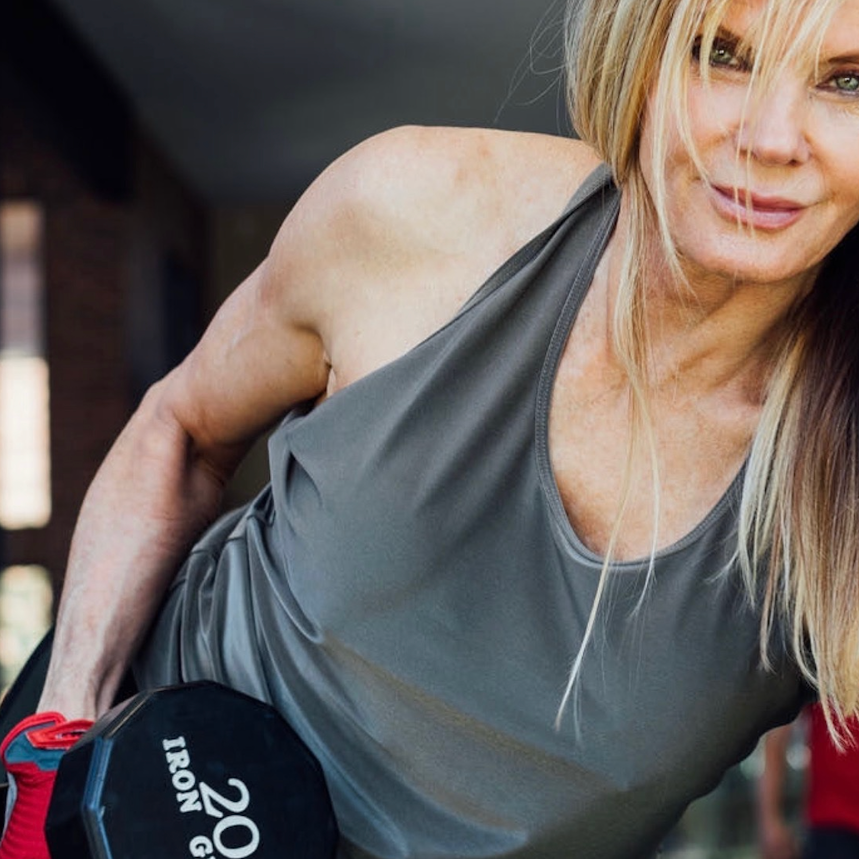Episode 17 | Mark Bunn | Nourish The Heart Before Nourishing The Body

LISTEN…CLICK PLAY!
Why you should listen –
One of the defining moments in my life was spending a week in Bali taking a meditation workshop and learning Ayurvedic principles from some of the best practitioners in the world.
You might be asking yourself….what are Ayurvedic principles? Stay tuned…because one of the lecturers at the workshop, and our podcast guest today, is Mark Bunn.
He’s the author of the absorbing book, Ancient Wisdom for Modern Health, which contains countless lovely nuggets of information, including Ayurvedic practices that help you learn to manage stress, and maintain peak performance. And, after hearing about his Seven Wisdoms, you might be inspired to shift your approach to taking care of your own health and wellbeing.
In this episode, we delve into combining Eastern and Western practices, including the following questions:
- What are the main principles of Ayurveda?
- How do you live in tune with nature’s cycles?
- Why is it vital to nourish the heart before nourishing the body?
FAMILIAR WITH PODCASTS? LISTEN ON iTUNES!
Follow Along With The Highlights
While everybody else was using music to get pumped up before a game, I was sneaking off to meditate: the internal quietness is important to our development. After I retired from playing, I got a book on Ayurvedic principles that I found very insightful and the combination of those ideas with my personal experiences traveling around the world – where people may be poor, by they are happy – was very instructive. Then, I returned to Australia, took some courses from some master practitioners, and then began to teach it myself.
Can you give us an overview of Ayurveda?
Ayurveda is defined as “the science of life”. If we think about how our world functions, there are certain laws that remain constant: how long our seasons are, that night follows day, a baby will eventually grow, ect… If we know all of these laws and understand how we are all connected to each other and the universe, then we have to recognize that we are subject to those same laws. For example, there are predictable laws about how we digest food, our sleep/wake cycles, the elimination of waste products, and all sorts of other things. This knowledge has been passed down orally for thousands of years and then eventually written down into books.
Whenever you hear about Ayurveda, you might start to hear about doshas. Can you talk a little bit about that and how it impacts both your diet and your exercise program?
Doshas are very important and, essentially, they tell us to remember that we’re all different. Different diets and exercise regimes will have different effects on different people. In Ayurveda, they say that we have different “constitutions”. The three fundamental doshas are vata, pitta, and kapha.
Vata-type people are “airy-type’ people – they’re bubbly, they’re the life of the party, but if there’s too much space in there, they can be more prone to certain disorders: insomnia, weight loss, dry skin, and constipation.
Pitta-type constitutions are the fiery ones. They’re business-oriented, passionate, competitive, and intellectual. But too much fire – spicy foods, hot summers, hot relationships – can express as indigestion, acid reflux, and anger.
Kapha-type people are the earthy ones. They’re more nurturing and nourishing to others. If they become out of balance – by eating heavy foods, not getting enough exercise, or not have enough variety – they can become stuck in the mud, put on weight, and more prone to diseases like diabetes.
The first question that an Ayurvedic practitioner asks someone isn’t “What’s wrong with you?” (like a modern practitioner asks). They ask, “Who am I talking to?” They try to get a sense of what the strengths, weaknesses, and tendencies are so that they can figure out how to get this constitution-type back into balance.
It’s important that people remember that this isn’t a one-size-fits-all system. I can’t tell you how many times I’ve had people share a diet program that has worked for them, but won’t work for others. Ayurveda allows us to recognize that everybody is different and then make the appropriate adjustments.
I have to tell you that I love how you emphasize “nourishing the heart before nourishing the body”.
This idea came from a couple of sources. Some of it came from my travels to Southeast Asia where these cultures that were so vastly different from our Western cultures focused on being happy, not on just being healthy. That’s an important distinction. Then, the other source came from when I learned transcendental meditation. I remember watching a tape of the Maharishi and he was just so happy! He used to say, “Bliss is the greatest medicine.” He was trying to point out that you shouldn’t make anything stressful – not eating, exercise, or work. If you do, you’re working against yourself and your own happiness.
That’s great! What does happiness mean to you? When are you at peak levels of happiness?
I’m happiest when I’m in nature. While I live in a city, I live close to water and trees – it’s very important to me. Also, I’m very happy during silence. Even if I’m in an airplane or a conference, I can focus inward and calm myself. Then, I can come back to the noise with some clarity and happiness. And, the third thing, is something that we call dharma in Ayurveda. Your dharma is that activity that you’re supposed to do – whatever it is, it’s the thing that you’re good at and enjoy. For me, I’m happy when I’m helping people be healthy and happy. When I get away from that idea, I do find that I get thrown off balance.
I’ve found Ayurvedic principles to really help me stay in-tune with my body while I’m traveling around the world. What does you think it means to live in tune with nature’s daily cycles?
You mentioned travel and Ayurvedic principles are so crucial in helping us understand what we need to balance while we’re traveling. You need to focus on vata while you’re moving around – more warm teas and foods, more rest, and warm oil massages can help ground us.
In terms of nature’s daily cycles, there’s a connection to what science calls circadian rhythms. The body goes through six different four-hour cycles where the body is designed to go through different functions for optimal health and well-being. That starts in the morning with elimination. All of these problems that we have in the morning are issues that are actually starting from the night before – so, you should focus on having a light meal the night before so that you can start the next day properly. This will make you feel lighter in the morning and help give you the energy to exercise. Then, you should have your big meal at lunch – this is your main meal. In the middle of the afternoon, you should have some vata teas or some seasonal fruits. Then, in the evening, in the kapha cycle, the body starts to wind down. It’s important to reduce all of those stimulants so you can get ready for sleep and start the next day on the right foot.
For more information, visit http://markbunn.com.au/.









